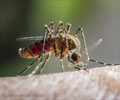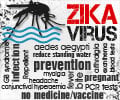Highlights
- WHO ends Zika public health emergency
- Health experts warn that this could hamper progress for further research and treatment
- Zika infection risk is low if necessary precautions are taken
But it no longer meets the requirements to be deemed an 'emergency'.
'We are not downgrading the importance of Zika,' said Dr Salama.
'Zika is here to stay, and the WHO's response is here to stay.'
“The Zika virus remains a highly significant and long term problem, but it is not any more a public health emergency of international concern,” the world health body’s emergency committee chair Dr David Heymann said.
Responding to the WHO announcement, the U.S. Centers for Disease Control called the move to be technical and cautioned that pregnant women should avoid traveling to areas with local transmission of Zika.
First outbreak in Brazil (May 2015) has led to instances of Guillain-Barre syndrome and pregnant women giving birth to babies with birth defects. I.e. microcephaly (abnormal small size of the fetus head associated with incomplete brain development).
- Zika virus spreads through the bite of Aedes aegypti
- Zika virus is closely related to the dengue virus
- Probable transmission through blood and sexual intercourse; from mother to child
- 1 in 5 people shows symptoms
- Symptoms include fever, skin rash, fatigue, red eyes, headache and joint pain
- Zika virus genome sequenced by the Institut Pasteur in French Guiana
- There is no medicine to treat Zika nor vaccine to prevent it
- In June 2016 the first Zika related case was reported in the US
The World Health Organization announced that the Zika virus outbreak, linked to , though it warned the epidemic remains a challenge. Brazil, the epicentre of the outbreak, has however refused to downgrade the risk, while experts swiftly lashed out against the world health body’s decision.
Ways to Protect Yourself from Zika Virus
- Avoid travel to Zika virus prone areas
- Prevent stagnation of water
- Spray on mosquito repellents
- Wear full sleeved shirts and full length pants
- Use mosquito nets
- Drink plenty of water












